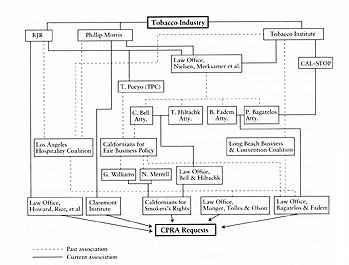The Tobacco Industry and the California Public Records Act
One final tactic strategically used by the tobacco industry to impede state and local tobacco control operations involved freedom of information

Figure 12. The tobacco industry's network of law firms and smokers' rights groups, which submitted requests to tobacco control organizations under the California Public Records Act. Source: S. Aguinaga and S.A. Glantz, The use of public records acts to interfere with tobacco control, Tobacco Control 1995;1995(4):222-230. Reproduced with permission of Tobacco Control (copyright BMJ Publishing Group).
DHS's Tobacco Control Section (TCS) received many more requests for public information than other seemingly controversial state-level health programs, such as AIDS and alcohol and drug programs or the HIV prevention program at the California Department of Education. In fact, TCS was the only health program receiving any requests; between 1991 and 1993, there were fifty-nine requests for 371 documents.[52] For example, on April 4, 1991, Mark Helm of the Los Angeles law firm Munger, Tolles & Olson wrote to the Tobacco Control Section to request
This tactic of using the freedom of information act as a form of harassment was to continue throughout the life of the program and eventually included requests to the health departments in the larger counties and the California Department of Education.[52] Program advocates, however, eventually understood how to handle such requests with minimal disruption to their operations: by requiring requests in writing and by assessing reasonable photocopying charges on the requesting parties.
Some of the LLAs responded to the requests by using them to call attention to the tobacco industry. In 1993, for example, the Contra Costa County LLA received a public records act request from a Marietta Stuart. The director replied by saying that complying with the request would disrupt the LLA's work and suggested that Stuart come in personally to inspect the documents and make photocopies. In response, the LLA received a call from the law firm Bell and Hiltachk, representing Californians for Smokers' Rights; the firm scheduled a time for someone to come with a copy machine to photocopy the documents. When Glenn Williams, a Californians for Smokers' Rights employee, arrived with a copier, the LLA director was waiting with the media to denounce what she perceived as harassment by pro-tobacco groups. The incident received wide coverage in the press, and requests to the LLA stopped.
The tobacco industry recognized that the public health community was getting more sophisticated in dealing with its tactics. For example, when Stratton, Reiter, Dupree & Durante was preparing its report for RJ Reynolds, one of the complaints in the report was the effectiveness with which TCS had dealt with records act requests: “TCS's heightened concern over the status of its '91-'92 Fiscal Budget, plus a profound screening process to ward off tobacco industry access to public documents, presented significant barriers to reviewing individual grants and county tobacco control plans. Thus a significant element of this research project involved creating access points to interviews and publications